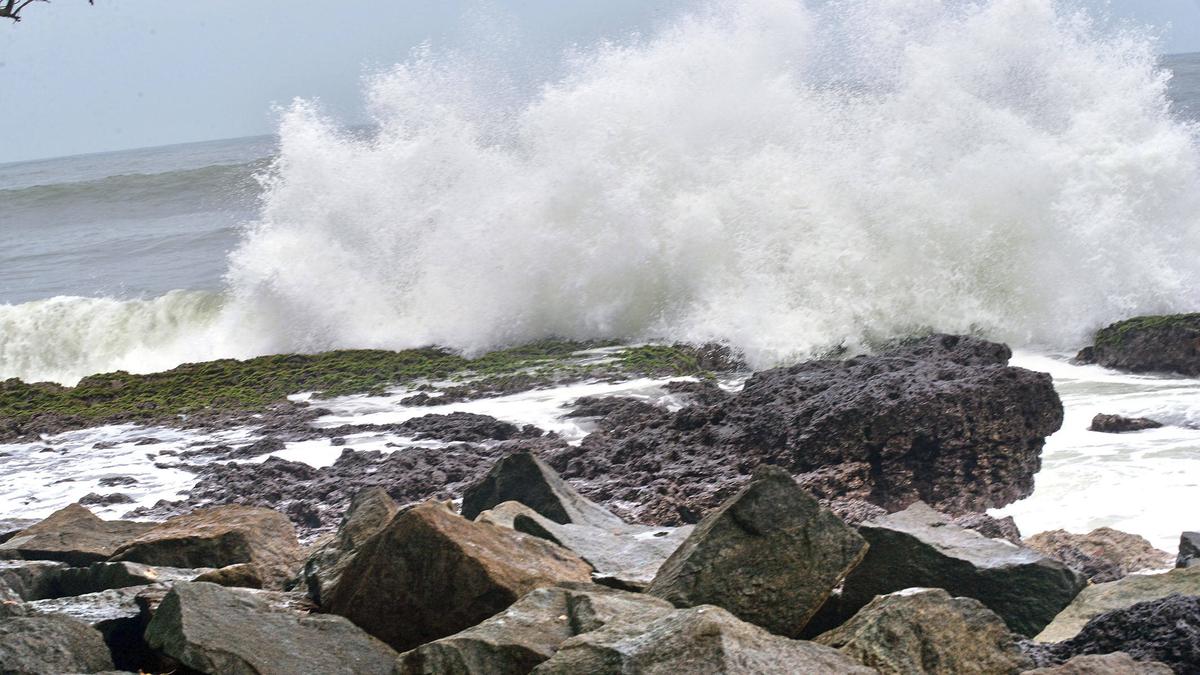
INCOIS issues alert to coastal States on rough seas, seeks halt in beach activities on May 4 and 5
The Hindu
Hyderabad-based INCOIS warns coastal States of India about potential coastal flooding due to high-period swells on May 4 and 5.
INCOIS – Indian National Centre for Ocean Information Services, has cautioned the States of Goa, Maharastra West Bengal, Odisha, Tamil Nadu, Kerala, Lakshwadeep and Andaman & Nicobar Islands of “total suspension of operational/recreational activities at beach/nearshore regions on the coastal States both on the east and west on May 4 and 5.
This is because of the possibility of swell surges and rough sea conditions associated with the effect of high-period swell waves that are approaching from the distant southern Indian Ocean. Fishermen and coastal populations have been particularly advised to be cautious about possible surging of waves like the gushing of sea water intermittently in the nearshore/beach region, particularly in low-lying areas.
Senior scientist and group director T. Balakrishnan Nair informed on Friday afternoon that the high period swells had started at approximately 10,000 km away from the Indian coast on April 26 in the southern Atlantic Ocean (15E and 60S) and slowly moved towards southern Indian Ocean (~35-55E; 60-50S) around April 28.
This had caused the high energy swell propagation towards the Indian coastal regions which is expected to hit the southern tip of India in the early hours of May 4 (02:30 am). These long-period swells combined with high tide conditions can cause coastal flooding in the low-lying areas of the above mentioned States on May 4 & 5, he alerted.
“The low-lying coastal areas are particularly vulnerable. We are presently monitoring the situation and the updates will appear on INCOIS website and the public is advised to check www.incois.gov.in/portal/osf/osf.jsp for further information and updates on the event,” he said.
Small vessels should not be plying nearshore and boats may be anchored at a fair distance from each other to avoid collision and damage. INCOIS, under the Ministry of Earth Sciences, has been issuing Ocean State Forecast (OSF) Services about wave height, direction and period, sea surface currents, temperature, etc., based on a multi-model operational forecasting system built upon numerical ocean models assimilated with real-time data from buoys deployed in the coastal waters as well as in the open ocean, even deep south in the southern Indian Ocean, he added.

“Writing, in general, is a very solitary process,” says Yauvanika Chopra, Associate Director at The New India Foundation (NIF), which, earlier this year, announced the 12th edition of its NIF Book Fellowships for research and scholarship about Indian history after Independence. While authors, in general, are built for it, it can still get very lonely, says Chopra, pointing out that the fellowship’s community support is as valuable as the monetary benefits it offers. “There is a solid community of NIF fellows, trustees, language experts, jury members, all of whom are incredibly competent,” she says. “They really help make authors feel supported from manuscript to publication, so you never feel like you’re struggling through isolation.”

Several principals of government and private schools in Delhi on Tuesday said the Directorate of Education (DoE) circular from a day earlier, directing schools to conduct classes in ‘hybrid’ mode, had caused confusion regarding day-to-day operations as they did not know how many students would return to school from Wednesday and how would teachers instruct in two modes — online and in person — at once. The DoE circular on Monday had also stated that the option to “exercise online mode of education, wherever available, shall vest with the students and their guardians”. Several schoolteachers also expressed confusion regarding the DoE order. A government schoolteacher said he was unsure of how to cope with the resumption of physical classes, given that the order directing government offices to ensure that 50% of the employees work from home is still in place. On Monday, the Commission for Air Quality Management in the National Capital Region and Adjoining Areas (CAQM) had, on the orders of the Supreme Court, directed schools in Delhi-NCR to shift classes to the hybrid mode, following which the DoE had issued the circular. The court had urged the Centre’s pollution watchdog to consider restarting physical classes due to many students missing out on the mid-day meals and lacking the necessary means to attend classes online. The CAQM had, on November 20, asked schools in Delhi-NCR to shift to the online mode of teaching.









